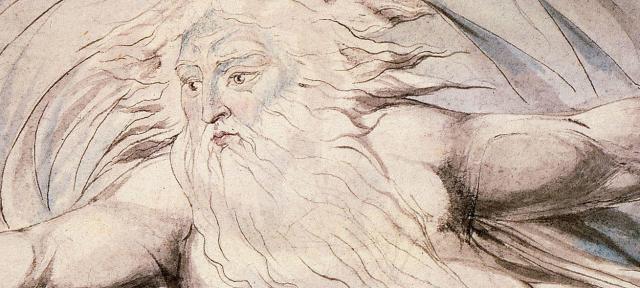A Deep Exploration of William Blake's Poetic Genius

“Joy & Woe are woven fine,” wrote William Blake in his poem “Auguries of Innocence.”
These words — written in 1803 — are uncannily contemporary for student Bailey Fernandez 15F, who wrote a 100-page paper on Blake for his Div III project, an undertaking both sublime and torturous.
“I did significant revising,” says Fernandez, who did a deep dive into Blake’s oeuvre. “I rewrote this thesis a million times.”
Fernandez focuses on Blake’s narrative poems, an interconnected series in which “the same characters repeatedly appear,” he says. “Taken together, these works create a mystical universe that you could compare to the fantasy world of [J. R. R.] Tolkien.”
Blake not only wrote poems, but he also illustrated them with original watercolors, making him a singular genius in the realms of both poetry and the visual arts during the Romantic era.
But what exactly did the concept of genius mean to the poet himself? Fernandez found it a question worth exploring. “The way Blake used the world genius is idiosyncratic and weird,” he says.
To more fully grasp the word’s connotations, Fernandez drilled down on its etymology and evolution.
“The proto-European root of genius is ‘gen,’ he explains. “It means ‘to produce’ in pre-Latin etymology, and in Latin it evolved to suggest an inner spirit. In Blake’s work, genius connotes poetic genius, a word that ultimately defines his conception of God.”
Fernandez describes Blake’s God as an imaginative generating force and an expression of a spiritual vision that exists in many forms, such as religion, poetry, and national identity.
Hampshire is the freedom to design your own path
Fernandez first discovered Blake as an AP English student in high school. His appreciation grew in a Div II interdisciplinary seminar taught by Alan Hodder, then a professor of comparative religion at Hampshire. Fernandez found himself, he says, “engaged in Alan’s thoughtful literary and critical analysis” of both Blake and other poets and writers.
Hodder encouraged his student’s fascination with Blake, and mentored him through a lengthy paper on the poet. This essay was the seed of Fernandez’s Div III project, tentatively titled “The Infernal East: An Excavation of the Genius in the Works of William Blake.”
This initial exploration left him hungry to know more. During his Div II summer, Fernandez did an internship in London — Blake’s hometown — at the Swedenborg Society, named for the 18th-century scientist, theologian, and philosopher Emanuel Swedenborg, who exercised tremendous influence on the Romantic poetry movement. His writings helped shape Blake’s worldview and development as an artist. The Swedenborg Society, which translates and publishes the philosopher’s work, houses a small press, a museum, and a library, where Fernandez learned about digital preservation in the archives.
By summer’s end, he decided to apply for a graduate program in literature and in February was accepted into the PhD program at the University of North Carolina Chapel Hill, which will most likely be where he lands.
“When I was applying to grad schools last fall, I used a chapter from my thesis as my writing sample,” Fernandez says. “So there was some added pressure. I wanted it to be perfect.”
He credits his Div III committee with helping him “see the whole forest,” he says, and not get bogged down in the intricacies of his argument. Chaired by Lise Sanders, a professor of English literature and cultural studies, the committee is also comprised of Polina Barskova, an associate professor of Russian literature (and herself a renowned poet); and Yasotha Sriharan, of the Writing Center.
“I hadn’t written an academic paper this long before,” Fernandez says. “I’m not a master of it like the three of them are. I wouldn’t be prepared for graduate school without what they’ve taught me.”
In retrospect — as he wraps up his Div III and last semester — Fernandez sees the school as a great match for someone like him, someone who, he says, doesn’t do well in a more institutional environment.
“Hampshire is the freedom to design your own path,” he says.



